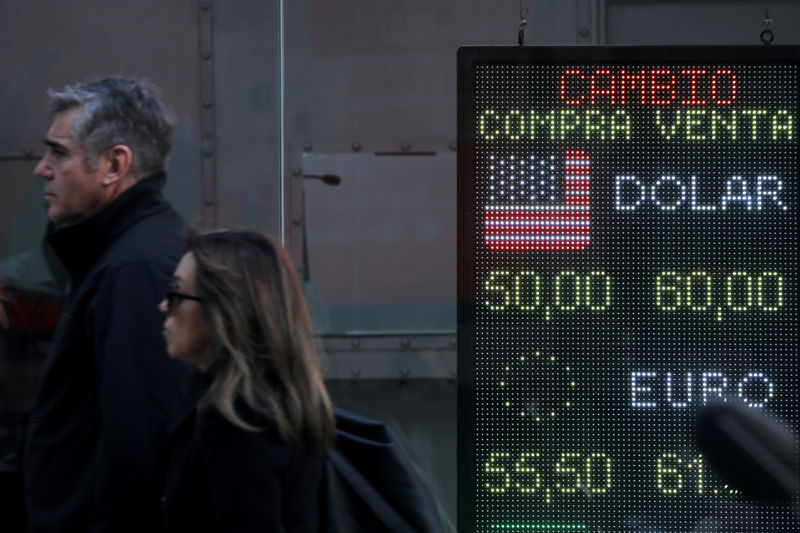By Eliana Raszewski
BUENOS AIRES (Reuters) - Argentina's black market peso is breaking away from the official spot rate by the largest margin since 2015, as political upheaval and currency controls spook investors about the currency's real value.
The peso , which has collapsed since a shock primary election in August hammered President Mauricio Macri, edged up in official trading on Monday after the government rolled out capital controls on Sunday to bolster the currency. It rose more sharply on Tuesday.
But in unofficial trade, the currency dropped on Monday and posted a slimmer rise on Tuesday, taking the gap between the two prices to near 10%, according to data compiled by Reuters. That move evokes memories of wide gaps under capital controls during the administration of former President Cristina Fernandez de Kirchner.
"When restrictions are put in place, even minor ones, there will always be a fear that is reflected by people resorting to the parallel market," said Claudio Loser, Washington-based head of consultancy Centennial Group Latin America.
"It's a matter of distrust," added Loser, former director of the Western Hemisphere department of the International Monetary Fund. "They help the central bank not to lose so many reserves, but the distrust is certain to appear."
The black market is an informal, and illegal, network of currency traders operating on the streets and in shadowy offices that has existed in Argentina for decades, waxing and waning, depending on demand for dollars outside regular channels.
In central Buenos Aires, hawkers known as "arbolitos" regularly shout out "cambio", offering currency exchange to passers-by, then taking them to backrooms or street stalls where they unveil stores of cash.
Currency controls are a potential spur for the black market, which in some periods of strict rule, including under the military in the 1980s, made up a large portion of total trades. Under free-market champion Macri, it has been more on the fringes.
"It's an illegal market, it's small," central bank head Guido Sandleris said at a briefing on Monday in response to a question from Reuters. He added that currency controls would only affect a small fraction of savers.
"It existed before these measures and will continue to exist. The vast majority of currency exchange trades in Argentina will continue to occur in the spot market."
Macri, who is fighting for political survival ahead of the general election on Oct. 27, has been forced to resort to controls he once strongly opposed. A big loss in the Aug. 11 primary led to the peso tumbling around 26% last month and the government announcing plans to delay debt repayments.
A foreign exchange trader said there had been a clear rise in demand for dollars via the parallel market, known locally as the "blue" market, and that over the next few days more people would likely seek to make a profit from the gap, buying dollars in the official market and selling them in the black market.
Former President Fernández de Kirchner, now a vice presidential candidate, imposed tight controls in 2011 that restricted savers' access to dollars. The gap between the official and unofficial peso in her last year of power in 2015 was often above 50%, Reuters data show.
Macri's main political rival, Alberto Fernandez, is now the clear favorite to win the general election, running on a ticket alongside Fernandez de Kirchner, a militant populist who led the country over two terms from 2007-2015.
The central bank and the treasury on Sunday rolled out a series of restrictions for buying and transferring foreign currency abroad, as well as deadlines for converting dollar earnings from exports into pesos in order to increase the amount of dollars in the financial system and reduce outflows.
Argentine bonds, equities and the peso collapsed after the primary election's result, with investors worried left-leaning Peronist Fernández could usher in interventionist economic policies, despite being seen as more moderate than his running mate.
Argentines, used to the economic instability that has roiled South America's No. 2 economy for years, have also moved to withdraw deposits from banks. Many people choose to save in the more stable dollar.
